G-CSF Is a Novel Mediator of T-Cell Suppression and an Immunotherapeutic Target for Women with Colon Cancer
Document Type
Article
Publication Date
6-1-2023
Abstract
PURPOSE: G-CSF enhances colon cancer development. This study defines the prevalence and effects of increased G-CSF signaling in human colon cancers and investigates G-CSF inhibition as an immunotherapeutic strategy against metastatic colon cancer.
EXPERIMENTAL DESIGN: Patient samples were used to evaluate G-CSF and G-CSF receptor (G-CSFR) levels by IHC with sera used to measure G-CSF levels. Peripheral blood mononuclear cells were used to assess the rate of G-CSFR+ T cells and IFNγ responses to chronic ex vivo G-CSF. An immunocompetent mouse model of peritoneal metastasis (MC38 cells in C57Bl/6J) was used to determine the effects of G-CSF inhibition (αG-CSF) on survival and the tumor microenvironment (TME) with flow and mass cytometry.
RESULTS: In human colon cancer samples, the levels of G-CSF and G-CSFR are higher compared to normal colon tissues from the same patient. High patient serum G-CSF is associated with increases in markers of poor prognosis, (e.g., VEGF, IL6). Circulating T cells from patients express G-CSFR at double the rate of T cells from controls. Prolonged G-CSF exposure decreases T cell IFNγ production. Treatment with αG-CSF shifts both the adaptive and innate compartments of the TME and increases survival (HR, 0.46; P = 0.0237) and tumor T-cell infiltration, activity, and IFNγ response with greater effects in female mice. There is a negative correlation between serum G-CSF levels and tumor-infiltrating T cells in patient samples from women.
CONCLUSIONS: These findings support G-CSF as an immunotherapeutic target against colon cancer with greater potential benefit in women.
Recommended Citation
Ray AL, Saunders AS, Nofchissey RA, Reidy MA, Kamal M, Lerner MR, Fung KM, Lang ML, Hanson JA, Guo S, Urdaneta-Perez MG, Lewis SE, Cloyde M, Morris KT. G-CSF Is a Novel Mediator of T-Cell Suppression and an Immunotherapeutic Target for Women with Colon Cancer. Clin Cancer Res. 2023 Jun 1;29(11):2158-2169. doi: 10.1158/1078-0432.CCR-22-3918. PMID: 36951682; PMCID: PMC10239359.

